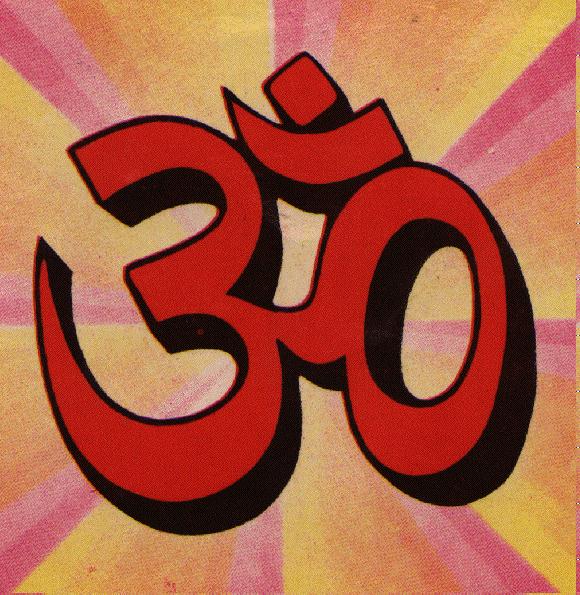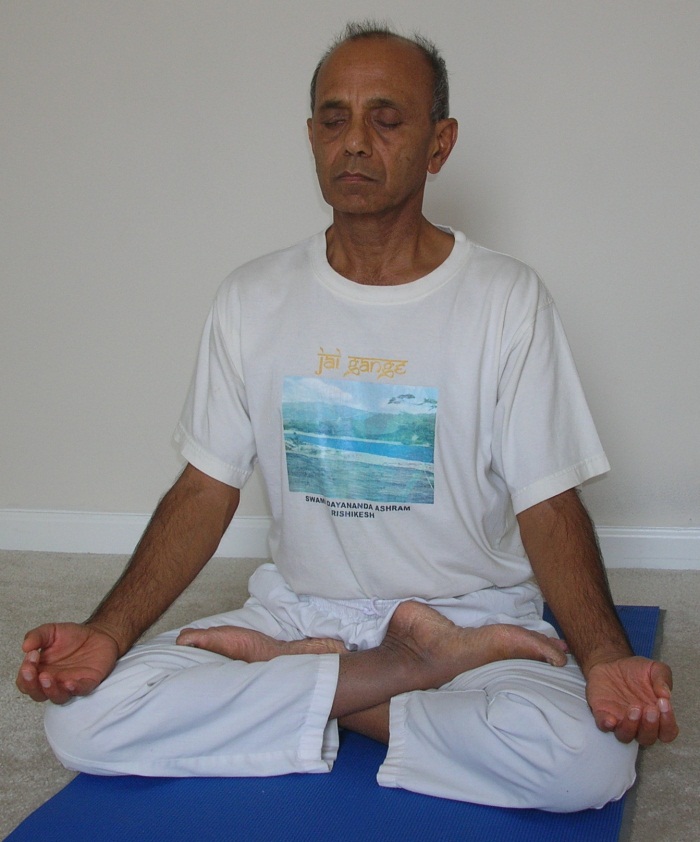|
|
– Guest Post by Umesh Gulati

The other day when my wife and I bought groceries at the Whole Foods and came to the cash register to pay, I noticed the sign OM in Sanskrit tattooed on the arm of a cashier. Out of curiosity, I asked her about that tattoo and she said that it was Om and her mother who was a Yoga teacher started her lesson by uttering this word, and had it tattooed it on her arm too. That led me to write this essay on this great symbol of OM for general information.
Continue reading »
In the recent "yoga in America" study report published in Yoga Journal, the top five reasons why people take to yoga are:
Flexibility (78.3 percent), general conditioning (62.2 percent), stress relief (59.6 percent), improve overall health (58.5 percent) and physical fitness (55.1 percent).
This is quite in line with what I hear from most of my students when they join my classes. Of course, if we go back to the roots of yoga and look at the reason why yoga was introduced in ancient times, we notice that the main reason for practicing yoga is "to calm the mind" (yogash-chitta-vritti-nirodhah – sutra 1.2 by Patanjali). Patanjali goes on to add that only when the mind is clam can we know "what our true identity/nature is" (tada drashTuH swarupe avasthanam – sutra 1.3). This knowledge of our true identity is also termed "self-realization".
It would be interesting to see what percentage of the poll participants gave "to attain self-realization" as one of the reasons.
Continue reading »

Today we are going to focus on one of the poses that is highly recommended as a hip and chest opener – the Rajakapotasana – राजकपोतासन -(King Pigeon Pose). There are a few different variations of the pose, some more challenging than the others. We are going to focus on the beginner level variation which itself can be somewhat challenging for those with tight hips, knees or thighs.
Step-by-step
Continue reading »

In today’s post, I am going to talk about a pranayama technique which involves both breath retention (kumbhaka) and application of the locks (bandhas). The technique, called Agnisara, is excellent for stoking the digestive fire (jatharagni) in the system which brings many benefits at various levels (see all the benefits below).
In the traditional Hatha Yoga system given in the Hatha Yoga Pradipika (HYP), there are six cleansing routines (Shad-kriyas) described. One of these techniques is "Dhauti" which is used to cleanse the intestinal and colon system. Even though the practice of Agnisara is not specifically mentioned in the HYP, another ancient Hatha Yoga text called the Gherand Samhita includes Agnisara as one of the many "dhauti" kriyas mentioned therein.
The word Agnisara is a composite of two words – "agni" which means "fire" and "sara" which means "essence". The essential nature of fire is attributed to the digestive system.
Step-by-step
Continue reading »

Super-brain Yoga! Yes, that’s the name of this yoga routine that we were asked to do as punishment in our early school days back in India. I wrote about it in my May newsletter.
Recently I received an email from a friend on the same topic. In this email was enclosed an article about the practice. I am not sure who the original author of the article is. However, since I thought the article was well written with lots of valuable information, I decided to publish it as a blog post.
If you know who the author is, please do let me know so I can acknowledge the person on the blog. Here is the article… (with only minor editorial changes).Â
Please read the complete article before you watch the video – it will give you the proper context.
Continue reading »
I am pleased to announce the next pranayama/meditation intensive.
Come and join me for this life-transforming experience where you will learn two of the most important aspects of a complete, integrated yoga practice – pranayama (breathing techniques) and meditation. In this program I will introduce you to many of the breathing techniques that are mentioned in our ancient yogic texts. I will also introduce the concepts and techniques of meditation. No prior pranayama or meditation experience is required.
- When: Wednesday, November 7- Sunday, November 18, 2012
- Time: 6:00 – 7:30 AM
- Location: Kalasrishti, 3000 Bearcat Way, Suite 112, Morrisville, NC 27560
- Daily Routine: Light stretching (10-15 minutes), Pranayama (30 min), Relaxation (10 min), Yoga philosophy (15 min), Meditation (20 min).
- Commitment: A firm commitment to follow this schedule and attend every day
- Fee: $75
Continue reading »

In a previous article, I presented a simple technique for meditation. In the technique presented therein, when the mind seems to drift too far away from the object of meditation, we go through a cycle of body awareness, breath awareness, third eye focus and finally go back to mantra meditation. We repeat this process as often as it becomes necessary so we can help calm the mind.
Why does the mind keep drifting away from the object of meditation? Because that’s just the very nature of the mind. All its life it has been given the freedom to jump from one topic to next, from one thought to next, all in quick succession. When no other activity is going on, it likes to daydream and think about pleasant things, either in the past or projecting them into the future. When we try to engage the mind in some productive activity, it knows how to find an excuse to stay off-topic and focus on some negative feelings from the past or some worry about the future.
Continue reading »
I am pleased to announce the next 21-day Yoga Challenge program. The past programs have been very well received by all the participants. For most of them, it has been truly a life-transforming experience. I invite you to join me on this exciting and deeply rewarding 21-day yoga journey. Here are the particulars:
- When: Monday, October 8- Sunday, October 28, 2012
- Time: 6:00 AM – 7:30 AM
- Where: Kalasrishti – 3000 Bearcat Way, Suite 112, Morrisville, NC 27513 (off Aviation Parkway)
- Commitment:
- A firm commitment to complete the program without missing a day
- At the end of the program, continue the same practice at home for another 21 days to make it a life-long habit
- Strongly recommended
- ‘sattvic’, light, nutritious, VEGETARIAN food (no meat, poultry, fish or eggs)
- No alcohol, drugs, tobacco or any other item of similar nature
- A personal meditation practice of at least 15 minutes on a daily basis
Daily Routine:
- Asana (physical postures/stretching)
- Yoga Nidra (relaxation)
- Pranayama (breathing techniques)
- Meditation
- Discussion about underlying concepts about yoga
Cost: $150
Continue reading »
Surya Bhedi (also called Surya Bhedana) pranayama can stimulate and awaken energy both in the physical and the pranic bodies. In particular, it can activate and energize the Pingala Nadi, which is associated with the right nostril or the "sun" nadi and the sympathetic nervous system.
Chandra Bhedi (or Bhedana) is just the opposite of Surya Bhedi and activates the Ida Nadi which is associated with cooling aspect and the parasympathetic nervous system.
The word "surya" means the sun and "bhedi" means one that can pierce. Thus the literal meaning of Surya Bhedi is to pierce or energize the right/Sun/heating nostril. Chandra means the moon and represents the cooling energy of the moon.
In the Hatha Yoga Pradipika, Surya Bhedi is described in the following three shlokas:
Verse 2.48: Sitting in any comfortable and stable posture, the Yogi should breathe in slowly and smoothly through the right nostril.
Continue reading »

Marichyasana (मरीच्यासन) is named after the sage Marichi (not sure why!). The word Marichi (मरीचि) literally means a ray of light. As per the Hindu mythology, Marichi was the son of Brahma and chief of the Maruts (also called vayu or wind-gods). He’s one of the seven (sometimes 10 or 12) sages (rishis) or lords of creation (prajapatis), who intuitively "see" and determine the divine law of the universe (dharma).
This asana can be performed in addition to or as an alternative to the more commonly practiced Ardha Matsyendrasana (Spinal Twist). It offers many of the same benefits as the Spinal twist.
Continue reading »
|
Video DVD
Yoga with Subhash (asana and pranayama)
- Basic asana sequence (~50 min) ($18)
- Pranayama/Meditation (~35 min) ($12)
- Set of above two ($25)
Video recording of special programs offered in the past
(Links to YouTube videos will be provided)
- 21-day yoga immersion - $40
- 7-day hip opening intensive - $20
- 14-day meditation intensive - $30
- 14-day pranayama intensive - $30
- 7-day hamstring/quad intensive - $20
- 14-day Level 2 yoga intensive - $35
Payment options:
- cash, check, Zelle (use subhashmittal@gmail.com) or Venmo (use 9199269717)
- PayPal (go to bottom of page) (add $5 to the fee listed above)
Please contact me if you would like to buy.
Recent Posts
-
40-minute Yoga sequence with asana, pranayama and meditation
-
FREE Yoga Class, Jan 1, 2026, 8:00-9:30 AM
-
21-day Yoga Immersion, Jan 5-25, 2026
-
FREE 2-day Pranayama session, Dec 20-21, 2025
-
Saṃskāra and Vāsanā: deep-seated impressions that mold our lives
-
14-day Meditation Intensive, Nov 9-22, 2025
-
Supta (Reclining) Vajrasana
-
Enjoying the journey
|






Recent Comments